July 14, 2005
Leaving Banco after completing two successful installations with the villagers
When I left Mali I realized that with less than $6,000 that I managed to raise, we completed the following: 1) The development of a local enterprise manufacturing solar panels and cookers locally 2) The completion of 7 locally constructed panels 3) The installation of two of the locally made panels in Banco that powered 6 lights and a solar pump and 4) The construction of 6 solar cookers. We could not help but be proud that such a small amount of money involved in this project is in stark contrast to the hundreds of thousands of dollars that characterize most development projects.
The traditional means of pulling water from the well
Two of the primary objectives of the solar project were to develop means for Malians to generate income through small business and to improve rural women’s condition in a country where women are compelled to spend 4-5 hours each day collecting water and firewood for cooking.
A machine that shells grains and saves women hours of labor
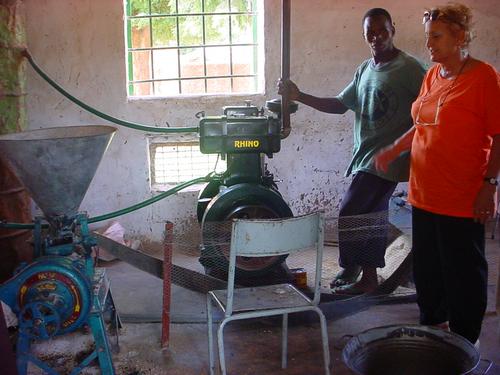
Loriana Dembélé finds funds to support projects such as the one above. The machine in the above picture is called a multi-functional platform. A group of women in the village of Sikasso paid Ji Duma through a micro-loan system and now own the machine. They use it to shell grains, thus saving them hours of hard labor. The women own the machine and generate income as other villagers must pay them in order to use the machine.
Loriana Dembélé, the Italian Consulate and President of the Malian non-profit, Ji Duma in Nyamina with the Chief of the village and a Ji Duma co-worker
Ji Duma has done a variety of development work in the villages over the past 20 years, including micro-enterprise development. Therefore, they are a perfect candidate to help spread productive uses of PV throughout Mali. Ji Duma will be the enterprise's first, essential customer! Ji Duma will buy locally produced panels from the new micro-enterprise, Afriq-Power. Ji Duma will then implement and spread the solar technology within the villages. They will be able to train villagers how to use PVs in order to generate income. Ji Duma will be the micro-enterprises's customer and support center. The micro-enterprise will have a much greater chance of being stable and successful as a result.
Mounting the 1000 liter water tank on the structure to hold the water that is pumped from the well by the 12Volt DC pump
Children in the village of Banco seeing running water for the first time because of the solar powered pump we installed in the well
The well in Banco that provides water to the children at the school as well as part of the village
The well was hand-dug by locals, hired by Ji Duma. President of Ji Duma, Loriana Dembélé, secured funding to build the well from a Catholic Church group in Rome, Italy.
The Niger River
Many Malian villages do not have wells and are therefore, obligated to gather water from the Niger River, an extremely contaminated source. Women often have to walk several kilometers in order to find water. Wells in villages provide a clean and accessible source of water.
Installing panels to bring light to the Banco school
Daniel Dembélé, Dumbya and Mamadou Kuiyate from the new micro-enterprise and Ji Duma, as well as two locals from Banco, installed the two 35 watt PV modules that they made the previous week in Bamako on the school. We ran a four wire two way cable between the two buildings since the charge controller panel and battery are in the director's office. Everybody was quite excited to have the light in the night.
Preparing to install the Malian produced solar panels on the Banco school
Daniel Dembélé (head of Afriq-power) and Kareem Keita (the local trainee in Banco), installing the charge controller in the school Director’s office
Instructions/diagram on how to connect the charge controller, panels and battery
Banco, a remote village in the southern part of Mali (about a 4 hour drive from Bamako)
Preparing to go to the village of Banco to complete a solar installation
Ji Duma's president, as well as Daniel, Kuiyate and Dumbya (the heads of the new enterprise that is being created) travel with us to the village of Banco to continue their training. Two locals from Banco will learn how to complete the installation as well as to make sure that maintenance of the system will be taken care of.
Mamadou Kouyate, Daniel Dembélé, Omar Coulibaly and Mary Graham
A new micro-enterprise has been created as a result of our training. The son of the president of Ji Duma, Daniel Dembélé, will work in the business with 4 other members who took part in the training (and who have all known each other for many years). The new micro-enterprise is the first business in Mali to produce panels.
Two locally produced 35 watt solar panels take in the sun!!!!!
The group we trained learned so unbelievably fast and are shown above after completing the construction/assembly of the first solar panels EVER produced locally in Mali!!! They learned how to cut, solder and assemble the cells to make the panels in less than 4 days.
Daniel Dembélé and Mamadou Kouyate test the voltage of the first, 35 watt panel constructed by Malians in Mali
Soldering the last string of cells that will be laid in the one of the two 35 watt panels being constructed
Testing the voltage of the strings of cells that will be used in the 35 watt panel
Dumbya, an employee of Ji Duma, soldering cells that will be used for the first 35 watt panel produced in Mali
Alusine, an electrician for Ji Duma and a participant in the workshop, cutting a solar cell that will be used for a 35 watt panel
Testing the soldered cells with a multimeter
Testing is necessary to make sure that the voltage of the entire string of cells is correct. If one cell has significantly lower voltage, it will cripple the efficiency of the string, and therefore must be replaced.
Daniel Dembélé (the designated head of the new micro-enterprise), learning how to solder ribbons to the cells in order to connect the cells for a small battery charger
It is necessary to learn how to solder smaller cells for technology such as a battery charger before soldering larger cells, used for panels. Soldering is a technique and the participants had to get used to soldering cells in order to avoid breaking more expensive cells used in panels.
Two workshop participants learning how to cut smaller solar cells
Small cells like this are used for devices like battery chargers or garden lights The group started working with single crystal Astropower PV cells, but since these are no longer available, they then learned how to make 30 and 60 watt modules using the ribbon-grown Evergreen Solar cells. These are much more fragile but able to be cut with care and are available in quantity.
Carolina Barreto giving a lecture in on how PV cells work and how they will be cut for the 35 and 50 watt modules we assembled
Carolina is fluent in French (Mali’s official language) but the lecture was also translated for the students into Bambara, the language spoken by the villagers.
12 participants who are learning how to build photovoltaic modules with all local materials, except the cells
The training was meant to empower Malians to enjoy self-sufficiency after my colleagues and I had completed our training and departed, hopefully to help others initiate similar programs in another country.
Buying materials in the local market in Bamako for the solar panel workshop
Dr. Komp, Carolina Barreto Cajina and I went through the local Malian market and purchased several materials needed for the project (e.g., wire/cable, breakers, wire clamps, circuit breakers, extension cords for soldering irons, silicon, and duct tape). Purchasing of materials on the local market with the Malians from Ji Duma is imperative to ensuring the project is sustainable. In the future, only solar cells should be imported. As a result of the market trip, the Malians from Ji Duma and the new micro-enterprise who are being trained will know how to find the materials needed on the local market.
Putting up the tarp for shade
The location of the workshop saved us a lot of time and energy. We won't have to drive 20 minutes back and forth through city traffic for lunch.
Space to hold the initial PV module training workshop being constructed (compliments of Consul Dembélé) in Consul Dembélé’s front yard
The purpose of the initial phase of the project was not only to provide light and running water to the school, but to get a local cottage industry started, producing solar panels and solar cookers from local materials. In order to do so, we trained local Malians to build, install and repair solar panels, water pumps, batteries and cookers.
Ji Duma, the local Malian NGO we are working with, will be like a "Grupo Fenix of Mali”
A Fulbright Day!!
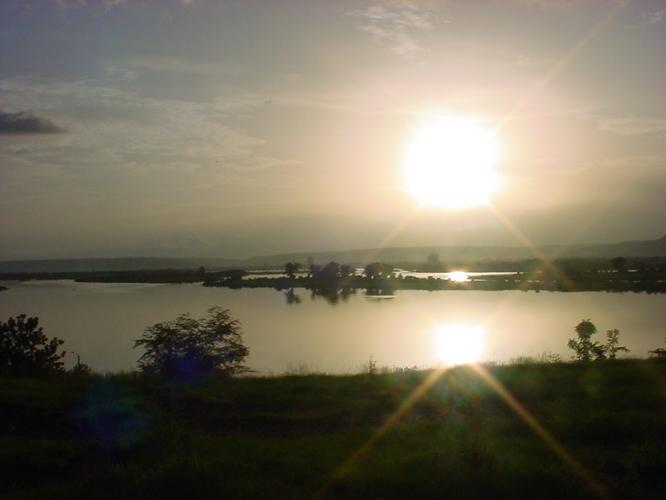
While raising money for the upcoming project to take place in March 2005, I decided to apply for a Fulbright. I assumed that we (Dr. Komp, Carolina Cajina, Ji Duma and I) would be successful in implementing the above project in March 2005, and therefore, I applied for the Fulbright in hopes of obtaining the opportunity and financial support to evaluate the project after its completion!
Loriana Dembélé, the Italian Consulate and President of the Malian non-profit, Ji Duma
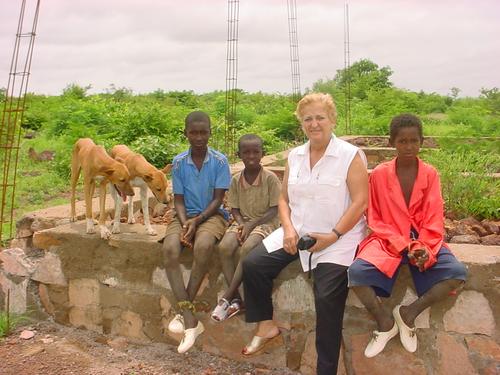
Loriana Dembélé was interested in expanding Ji Duma’s use of solar energy technology. I returned to the states and established Small Practical Projects LLC in hopes of facilitating solar projects in developing countries. I raised the money necessary to bring Dr. Komp and Carolina Cajina to Mali to teach the Malians to build panels and complete the installation of lights and a water pump at the Banco Schoool in the rural village of Banco.
Carolina Barreto Cajina
I attracted a group of 12 highly motivated Malians interested in learning how to build the technology. Upon returning to the states, I contacted Dr. Richard Komp and Carolina Barreto Cajina, who had worked together with Grupo Fenix to establish solar technology in Nicaragua. They agreed to travel to Mali to help the Malians establish the local enterprise by teaching them how to build and install solar technology, utilizing the support and implementation skills of Ji Duma.
Fuelwood in Mali
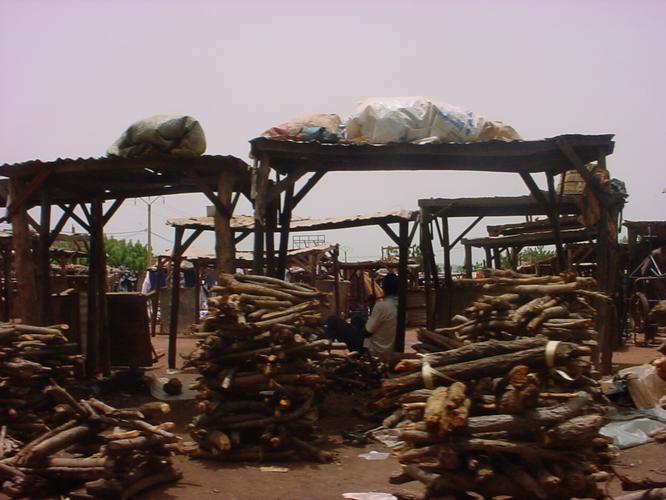
Solar ovens do not use fuelwood, or other traditional energies, which account for more than 90% of Mali’s domestic energy consumption. Fuelwood harvesting is a leading cause of deforestation in Mali. Solar cookers seek to ameliorate this desperate situation.
Dr. Komp with a box solar oven, produced by the micro-enterprise we birthed, Afriq-Power, in Mali
Solar ovens are built with all local materials, do not require panels and can bake and cook as well as any regular oven.
Suni Solar, a micro-enterprise that develops solar technology in Nicaragua
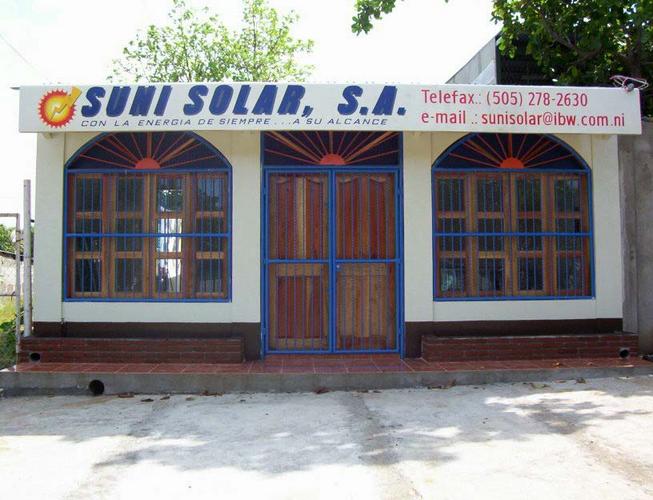
It serves as a model for the Malian enterprise. This enterprise will allow Malians to more easily afford energy as an imported panel may cost up to twice as much as a locally produced one, thus enabling them to bring light, running water and eventually electricity for appliances (e.g., tools, refrigerators, televisions, etc) to their rural villages.
Mali in a map of the continent of Africa, with over 53 individual countries
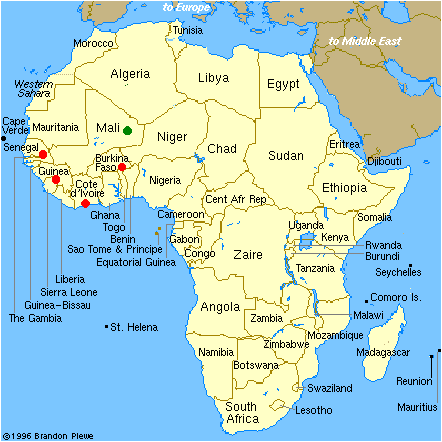
Mali is larger than Texas and California combined. I first visited Mali in the summer of 2004 in the hopes of finding a small, motivated group of people interested in establishing a Malian micro-enterprise that would locally produce solar panels and, eventually, other solar technology, such as solar ovens.
Leaving Banco after completing two successful installations with the villagers
When I left Mali I realized that with less than $6,000 that I managed to raise, we completed the following: 1) The development of a local enterprise manufacturing solar panels and cookers locally 2) The completion of 7 locally constructed panels 3) The installation of two of the locally made panels in Banco that powered 6 lights and a solar pump and 4) The construction of 6 solar cookers. We could not help but be proud that such a small amount of money involved in this project is in stark contrast to the hundreds of thousands of dollars that characterize most development projects.


